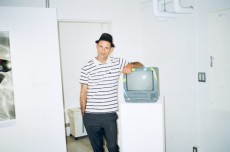アーロン・ローズ 来日インタビュー “Now & Then: A Decade of Beautiful Losers” / Interview with Aaron Rose about “Now & Then: A Decade of Beautiful Losers”
NeoL / 2019年10月11日 17時0分
アーロン・ローズ 来日インタビュー “Now & Then: A Decade of Beautiful Losers” / Interview with Aaron Rose about “Now & Then: A Decade of Beautiful Losers”
1990年代、ニューヨークのロウアーイーストサイドにアレッジド・ギャラリー(The Alleged Gallery)という小さなギャラリーがオープンした。DIY精神で自分たちのアート作品を展示していたのは、スケートボードやサーフィン、グラフィティに夢中だった若者たち。ただ好きなことをして楽しんでいた彼らだったが、その活動は次第に世界的な注目を浴びるようになり、それまで高尚なものだったアートの概念をも覆してしまった。
2008年に公開された『ビューティフル・ルーザーズ』は、アレッジド・ギャラリーを設立したアーロン・ローズが監督を務め、バリー・マッギー、エド・テンプルトン、マイク・ミルズ、トーマス・キャンベルら、アレッジド・ギャラリーを代表するアーティストたちの証言とともに、彼らの起こしたムーブメントの軌跡を描いたドキュメンタリー映画。昨年夏には映画公開10周年を記念して、ニューヨークで展覧会「Now & Then: A Decade of Beautiful Losers」が開催された。
そしてこの夏、「Now & Then: A Decade of Beautiful Losers」が東京に上陸。アレッジド・ギャラリーにゆかりのあるアーティストたちの作品がRVCA SHIBUYA GALLERYとTHE CORNERに展示され、多くのファンを魅了した。ここでは来日したアーロン・ローズのインタビューをお届けする。(→ in English)
――2008年に映画『ビューティフル・ルーザーズ』の公開記念イベントで来日された時のことを覚えています。もう10年も経ったなんて信じられないですが、今はどのようなお気持ちですか?
アーロン・ローズ「そうだね。でも映画の公開からは10周年だけど、僕らアーティストにとっては25年なんだ。アレッジド(・ギャラリー)は1992年にスタートしたからね。だから、10周年と言われても大したことには感じないんだ。僕らはティーンエイジャーの頃から、25年もこういうことをやっているわけだから」
――アレッジド・ギャラリーはどのように始まったのですか?ずっとギャラリーを運営したいと思っていたのですか?
アーロン・ローズ「そうではなくて、ただ安かったからなんだ。店を借りたんだよ。かなりでかくて、2000平方フィート(約185平方メートル)くらいあって家賃は月400ドルだった」
――すごいですね!
アーロン・ローズ「あのエリアに店を持ちたがる人なんていなかったからね(笑)」
――今ニューヨークのロウアーイーストサイドで店舗スペースを借りようとしたら、かなり高そうですね。
アーロン・ローズ「今だったら月2万ドルくらいだと思う。当時は誰も寄り付かないエリアだったから、あそこでビジネスをやりたがる人なんていなかったんだ。だからものすごく安かった。僕らはそこを住居として借りたんだけど、店舗スペースが付いていた。僕もルームメイトたちも誰も使っていなかったから、『あのスペースで何かやろうぜ』と提案したんだ。それでみんなアーティストだったから、パーティーを開き始めた」



――そもそも、なぜニューヨークに引っ越したのですか?
アーロン・ローズ「バンドをやっていたんだ。でもニューヨークに引っ越して6ヶ月くらいで解散してしまった。その後はいろんな仕事をしながら、次に何をやるかよくわからないまま遊んでいたんだ」
――当時はこのようなムーブメントを起こすつもりはなかったんですね。
アーロン・ローズ「意図的ではなかった。いまだに変わっていないんだけど、ニューヨークのギャラリーは上から目線で、若手のアーティストにはあまり興味を示さないんだ。当時は特にそうだった。僕らがアートを見せられる場所は他になかったんだ」
――当時のロウアーイーストサイドはどのような場所でしたか?
アーロン・ローズ「ドラッグや暴力が蔓延していた。僕らはドラッグディーラーたちとも仲良くしていたんだ。ヘロインの袋には種類別にいろんな絵が描いてあって、僕らはディーラーたちに頼まれて袋のデザインをしていた(笑)」
――アレッジド・ギャラリーはどのようにしてあのような場所になったのですか?
アーロン・ローズ「スケートボードやグラフィティを通して。でも、主にスケートボードだね。僕はスケーターだったんだけど、友だちも全員スケーターで、みんな絵を描いていた。当時のスケートシーンはすごく小さくて、今みたいに人気のあるものではなかったんだ。だから、みんな知り合いだった。僕とエド(・テンプルトン)もスケートを通じて出会ったんだよ」



――アレッジドではエド・テンプルトンやバリー・マッギー、トーマス・キャンベルら、素晴らしいアーティストたちが作品を展示していたそうですね。彼らとは友だちだったのですか?
アーロン・ローズ「友だちだったり、知り合いだったり。それにみんな(スケートの)ツアーを回っていたから、ニューヨークに来ると一緒に遊んでいたんだ。それで『僕も絵を描くんだけど、今度ここで作品を展示してもいい?』という話になっていた」
――SNSがない当時はどうやって情報を得ていたのですか?
アーロン・ローズ「FAXで(笑)」
――90年代っぽい!
アーロン・ローズ「電話するか、FAXでたくさん手紙をやりとりしていたんだ。今でも持っているよ。すごく色あせてきたけど、FAXはたくさん取ってあるんだ」
――ギャラリーで食べていけるようになったのはいつ頃ですか?
アーロン・ローズ「作品が売れ始めてからだと思う。でも最初の丸3年はリトル・リッキーズという店で働いていたんだ。朝11時から夕方6時まで仕事をして、夜の7時から深夜12時までギャラリーを開いていた。昼間はやっていなかったんだ。それというのもマックス・フィッシュというバーがあって、うちのギャラリーの隣で同じ時間に営業していた。だから、マックス・フィッシュの開店と同時にギャラリーもオープンしていたんだ」
――アレッジドでの一番の思い出は?
アーロン・ローズ「何も知らずにバカでいられたこと」
――そういう時期が最高ですよね。
アーロン・ローズ「ああ、今は賢くなりすぎた。僕らは10年ほど場所を移動しながらギャラリーを運営していた。自分たちのせいでもあるんだけど、次第にロウアーイーストサイドがトレンディーなエリアになってしまって、家賃を払えなくなってしまったんだ。当時の大家はすごくクレイジーで、住人を追い出すためなら殺人もしかねないような人たちだった」
――え!?
アーロン・ローズ「当時のニューヨークは今とは違ったんだよ(笑)」



――アレッジド・ギャラリーから生まれたムーブメントの軌跡を描いたドキュメンタリー映画『ビューティフル・ルーザーズ』の公開から10周年を記念して、去年の夏にニューヨークで展覧会を行ったそうですね。アレッジドにゆかりのあるアーティストたちが再び集まったそうですが、いかがでしたか?
アーロン・ローズ「うれしかったよ。僕らは長年にわたって友人関係を保っているのだけど、今はみんなそれぞれの生活があって、頻繁に会えるわけではないからね。一緒に成長して、一つのシャボン玉だった僕らは、それぞれのシャボン玉を作って飛んで行ったんだ。だから最近ではほとんど会わないんだよ。展覧会は大盛況で、毎朝(ギャラリー前に)客が並んでいた」
――素敵ですね。
アーロン・ローズ「東京もそうなるんじゃないかな。日本はヨーロッパや他のどこよりもずっと前から、僕らのアートを理解してくれた。ニューヨークと日本が理解してくれたんだ。ニューヨークの展覧会は本当にノスタルジアを感じたよ」
――日本ではあの映画をきっかけに、さらにアレッジドのアーティストたちのファンが増えたと思います。
アーロン・ローズ「まだ全員が若いうちにあの映画を作って、本当によかった。多くのドキュメンタリーではみんな年を取っているだろう? 『あの頃は〜』と話しているイメージだ。みんなが若いうちに映画を作れたのは、すごくよかったと思っている」




――アレッジド・ギャラリーのムーブメントの後、何が一番大きく変わったと思いますか?
アーロン・ローズ「すべてがビッグになったよね。何事もビッグになると、結果的に内容が乏しくなる。ストリートアートみたいにね。最悪だよ。ものすごく小さくて純粋なものとして始まったのに、今ではすべての街のすべての街角がアートで覆われている。人々が目にする芸術作品が増えたという意味では、それをよしとする自分もいるのだけど、そこにはもう個性がないんだ。それは少し悲しいけど、カルチャーやすべてのことにおいて、よくあることだからね。だから怒っても仕方ないんだけど、重要ではなくなってしまうんだ」
――今のあなたにとっての最大のインスピレーションは何ですか?
アーロン・ローズ「アートにはあまり見出せないな。今のアートの世界はおかしな状況だと思う。昨日もESPOと話していたんだけど、すべては戻ってくるんだよね。巨額の金が動く、商業的で巨大なアートの世界から、今後また振り戻ってくるような気がしている。人々はそういったものを好まなくなるだろう。もっと私的な芸術作品に戻ってくるんじゃないかな。カルチャーにおいては、いつもそういうことが起きるからね」
――確かにそうですね。
アーロン・ローズ「だから、僕にとっての最大のインスピレーションは、すべてのものは繰り返すということ。過去10年くらいの間には、『ビューティフル・ルーザーズ』のアートに誰も興味を持たない長い時期があった。(興味を示すのは)キッズだけだったよ。今は高校の美術の授業で生徒たちにあの映画を見せているらしい。だから、ティーンエイジャーの世代はすごく夢中なんだ」
――キッズに話しかけられたりしますか?
アーロン・ローズ「ああ、それに年中手紙やインスタグラムのDMが届く。でも、こういうスタイルの作品が人気のない奇妙な時期もあったんだ。とはいえ、それもまた繰り返すだろう。グレイトフル・デッドみたいにね。急にみんなグレイトフル・デッドが大好きになって、Tシャツとか着ているだろう? 過去20年くらいは『グレイトフル・デッド!? ありえないだろ!』って感じだったのに(笑)」
――アーティストを目指している若者たちに何かアドバイスはありますか?
アーロン・ローズ「トレンドは無視しろ。トレンドはいつでも君を裏切るから。ようやくマスターしたと思った頃には、みんな他のことに夢中になっているよ」

photography Shuya Nakano
text Nao Machida
edit Ryoko Kuwahara
Aaron Rose(アーロン・ローズ):
現在はロサンゼルスで暮らすライター、アーティスト、ディレクター、フリーランスのキュレーター。1992年から2002年の間、ニューヨークの伝統的ギャラリー、アレッジト・ギャラリーのオーナー兼ディレクターとして、マーク・ゴンザレス、クリス・ヨハンソン、マイク・ミルズ、エド・テンプルトン、バリー・マッギー、フィル・フロストら、数多くのアーティストたちを世に送り出した。その後も彼のアートへの情熱は消えることなく、2004年2月にコンテンポラリーアートセンターで開かれたクループ展「ビューティフル・ルーザーズ」をディレクションする。この活動は世界を跨いで続いていた。2008年、自身が監督を務めたドキュメンタリー映画『ビューティフル・ルーザーズ』を発表。現在は自社であるアート本の出版社アレッジトプレスで出版を手がけるほか、RVCAが発行するフリーマガジン「ANP Quarterly」の共編者として活躍している。
https://www.aaronrose.co
(This interview is available in English)

――Welcome back to Japan!
Aaron Rose: Thanks! It's good to be here.
――I remember when you brought the film to Japan in 2008. I can't believe it's been 10 years already. How are you feeling now?
Aaron: I know! It's the 10-year anniversary of the release of the "Beautiful Losers" movie, but for all of us artists, it's 25 years. The Alleged started in 1992, so 10-year anniversary doesn't feel like such a big deal. Because we've all been doing this for 25 years since we were teenagers.
――How did you start the Alleged Gallery? Did you always want to run a gallery?
Aaron: No, it was just cheap. We rented a store. It was pretty big, almost 2,000 sqft and $400 a month.
――Wow.
Aaron: [Laughs] Yeah, because nobody wanted a store there.
――That location must be very expensive now.
Aaron: I think $20,000 a month now. Nobody wanted a business there back then, because nobody would go there. So it was super cheap. We rented it basically as our house, but then it had this storefront. Me and my roommates, nobody slept in there, so I said "Let's just do something in there." Everybody was artist, so we just started having parties.



――Why did you go to New York in the first place?
Aaron: I was in a band but we broke up there. We moved to New York and we were there for six months, and then we broke up. After that I was just working jobs, hanging out and not knowing really what was next.
――So back then you weren't really thinking about starting this whole movement?
Aaron: No, it wasn't on purpose. The galleries in New York, they are still like this, but they are pretty snobby and not really interested in younger artists, especially then. There was nowhere else to show your artwork.
――What was the LES like back then?
Aaron: A lot of drugs, a lot of violence. We were friends with all the drug dealers. Heroin bags always had artwork on it for different kinds of heroin, so they would come to us and we would design their heroin bags [laughs.]
――How did the Alleged evolve as it was?
Aaron: Through skateboarding mainly, and graffiti, but mostly skateboarding. I was a skater, all my friends were skaters and everyone drew. Skateboarding was really small then, it wasn't so popular like it is now, so you knew everyone. That's how I met Ed [Templeton] at the time, just through skateboarding.



――You had great artists show their artwork at the Alleged, such as Ed Templeton, Barry McGee and Thomas Campbell just to name a few. Were you guys all friends?
Aaron: Yeah and we knew of each other. And everyone would tour (for skating) so when they come through town, they would hang out. And it was like, "Oh I draw. Can I come back and show my artwork?"
――How did you guys get information back then without social media?
Aaron: Faxing [laughs.]
――So 90’s!
Aaron: Either on the phone or lots of faxing letters. I still have them. They are really faded now, but I still have tons of faxes.
――When did you know that you could run the gallery for a living?
Aaron: I think once people started wanting to buy things. But the whole first three years, I had a job at a shop called Little Rickey's. I worked there from 11am to 6pm. And then from 7 o'clock till midnight I opened the gallery. It was never opened during the day, because there was Max Fish bar that opened at the same time next door. So when Max Fish opened, the gallery opened at the same time.
――What is your favorite memory of the gallery?
Aaron: Being stupid and not knowing anything.
――That's the best.
Aaron: Yeah, too smart now. We had the gallery for about 10 years in different places because we had to move. Because the Lower East Side—partly because of us—got more trendy, we couldn't afford the rent. And our landlords at the time were really crazy guys. They would murder tenants to get them out.
――What!?
Aaron: [Laughs] New York was different then.



――Last year was actually the 10-year anniversary of the film “Beautiful Losers,” and you had the show in New York. How was it like having everyone back together?
Aaron: It's nice because we've all pretty much stayed friends over the years. And we don't see each other very often because everybody has different lives. We just grew up and we were one bubble, and then everyone made their own bubbles and floated out. So we don't see each other, barely ever. And there were people lined up every morning at the show.
――That's sweet.
Aaron: I think in Tokyo, too, because Japan understood this artwork long before even Europe or anywhere else. New York and Japan, really... So in New York City there was a real nostalgia.
――I think even more people in Japan got into your art because of the movie.
Aaron: I'm really happy we did that movie when we were all young. Because a lot of times with a documentary, everybody is old. They would be talking about it like, "Back then..." It was really cool to do it while everybody was still young.




――What do you think was the biggest change after the Alleged Gallery for you?
Aaron: Well, everything got big. And when it gets big, it ends up getting watered down, and like street art, I hate it. It started off something really small and very pure, and now it's just like every street is covered with art in every city. And part of me likes that, there is more artwork that people are looking at, but there is no personality any more. That's a little bit sad, but that's what happens with culture, with everything. So you can't be angry but it's just become like, it's not important any more.
――What is your biggest inspiration now?
Aaron: Not so much in art. I think the art world is in a funny place right now. It's funny, me and ESPO were talking about it yesterday, everything swings back. And I feel like now we are about to spring back again, away from this huge money, huge commercial, huge art world that people are not going to like any more. They swing back to more personal kind of artwork, because culture always does this.
――True.
Aaron: So my biggest inspiration is that everything cycles. There is a big period of time, like maybe over last ten years, where nobody was really so interested in this “Beautiful Losers” artwork but only kids. Now the movie is taught mostly in high school. In high school art programs it's shown all the time. So teenager generations are really into it.
――That is so cool. Do kids come up to talk to you?
Aaron: Yeah, and write letters all the time, and DMs on Instagram. But there was a weird time when this kind of style of work was not popular. But that cycles too. Like you see with everything, like all the sudden now everyone loves Grateful Dead, wearing Grateful Dead shirts. But for 20 years, "Grateful Dead!? Man, no way!" [laughs]
――Any advise for the young aspiring artists?
Aaron: Ignore the trend. The trend will always let you down. Just when you think you've mastered it, then everybody will be into something else.

Aaron Rose
https://www.aaronrose.co
photography Shuya Nakano
text Nao Machida
edit Ryoko Kuwahara
関連記事のまとめはこちら
https://www.neol.jp/art-2/
この記事に関連するニュース
-
「私たちを人間として扱ってほしい」やまぬ爆撃、家族との別れ…ガザ脱出の友人を探し記者がエジプトへ「戻りたいけど誰も戻れない」【脱出者が語る惨状】
北海道放送 / 2025年1月18日 9時45分
-
旅行者はGoogleを活用し続けつつ、AI生成のソーシャルメディアコンテンツにも肯定的
PR TIMES / 2025年1月14日 10時45分
-
この英語ってどんな意味?「 plot twist 」
OTONA SALONE / 2025年1月11日 7時0分
-
この英語ってどんな意味?「That’s life.」
OTONA SALONE / 2024年12月27日 17時30分
-
tHE GALLERY HARAJUKUにて、2025年1月2日(木)より、THEKLA KAISCHAURI個展「FRACTURED」を開催。
PR TIMES / 2024年12月25日 14時45分
ランキング
-
1たこ焼き屋を営んでいた50代男性の後悔。「タコの代わりに入れたもの」がバレて店が潰れるまで
日刊SPA! / 2025年1月19日 8時53分
-
2中居騒動でフジが露呈「日本的組織」の根深い問題 いかに内部が狂っていても外まで伝わらないワケ
東洋経済オンライン / 2025年1月19日 8時40分
-
3「塩見征久」っていったい誰? 関東一円で相次ぐ「謎の捨て看板」SNSで広がる目撃証言
まいどなニュース / 2025年1月19日 11時2分
-
4日本海軍で「最も活躍した戦艦」とは 最強の大和ではない!? 老艦なのに活躍できたワケは
乗りものニュース / 2025年1月17日 18時12分
-
5「雪遊びしていた犬が刺さってる」 謎すぎる光景に8.6万人驚がく...何があった?
Jタウンネット / 2025年1月19日 8時0分
記事ミッション中・・・
記事にリアクションする
![]()
記事ミッション中・・・
記事にリアクションする

エラーが発生しました
ページを再読み込みして
ください










